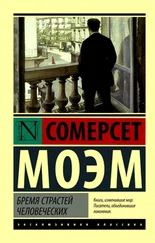| "Oh yes, I do: I've met a hundred and forty-seven of him." |
- Нет, знаю: я уже видел сто сорок семь таких, как он. |
| Weeks' eyes twinkled, but Philip, who did not understand American humour, pursed his lips and looked severe. |
Глаза Уикса смеялись, но Филип, не понимавший американского юмора, недовольно надул губы. |
| Weeks to Philip seemed a man of middle age, but he was in point of fact little more than thirty. |
Уикс казался ему пожилым, хотя на самом деле американцу лишь недавно исполнилось тридцать. |
| He had a long, thin body and the scholar's stoop; his head was large and ugly; he had pale scanty hair and an earthy skin; his thin mouth and thin, long nose, and the great protuberance of his frontal bones, gave him an uncouth look. |
Он был высок, очень худ и сутулился, как человек, привыкший сидеть над книгами; большая и некрасивая голова с редкими соломенными волосами и землистым цветом лица, тонкие губы, длинный острый нос и выпуклый лоб придавали ему нескладный вид. |
| He was cold and precise in his manner, a bloodless man, without passion; but he had a curious vein of frivolity which disconcerted the serious-minded among whom his instincts naturally threw him. |
Холодный и педантичный, словно в жилах у него текла не кровь, а вода, и чуждый страстей, он иногда проявлял удивительное озорство, приводившее в замешательство серьезных людей, среди которых он постоянно вращался. |
| He was studying theology in Heidelberg, but the other theological students of his own nationality looked upon him with suspicion. |
В Г ейдельберге он изучал теологию, но остальные студенты-теологи его национальности относились к нему с опаской. |
| He was very unorthodox, which frightened them; and his freakish humour excited their disapproval. |
Их пугало его свободомыслие, а его прихотливый юмор вызывал их осуждение. |
| "How can you have known a hundred and forty-seven of him?" asked Philip seriously. |
- Где же вы могли видеть сто сорок семь таких, как он? - серьезно спросил Филип. |
| "I've met him in the Latin Quarter in Paris, and I've met him in pensions in Berlin and Munich. |
- Я встречал их в Латинском квартале в Париже и в пансионах Берлина и Мюнхена. |
| He lives in small hotels in Perugia and Assisi. |
Они живут в маленьких гостиницах в Перуджии и Ассизи. |
| He stands by the dozen before the Botticellis in Florence, and he sits on all the benches of the Sistine Chapel in Rome. |
Их то и дело видишь у картин Боттичелли во Флоренции; они сидят на всех скамьях Сикстинской капеллы в Риме. |
| In Italy he drinks a little too much wine, and in Germany he drinks a great deal too much beer. |
В Италии они пьют слишком много вина, а в Германии - чересчур много пива. |
| He always admires the right thing whatever the right thing is, and one of these days he's going to write a great work. |
Они всегда восхищаются тем, чем принято восхищаться - что бы это ни было,- и на днях собираются написать великое произведение. |
| Think of it, there are a hundred and forty-seven great works reposing in the bosoms of a hundred and forty-seven great men, and the tragic thing is that not one of those hundred and forty-seven great works will ever be written. |
Подумать только - сто сорок семь великих произведений покоятся в душе ста сорока семи великих мужей, но трагедия заключается в том, что ни одно из этих ста сорока семи великих произведений никогда не будет написано. |
| And yet the world goes on." |
И на свете от этого ничего не меняется. |
| Weeks spoke seriously, but his gray eyes twinkled a little at the end of his long speech, and Philip flushed when he saw that the American was making fun of him. |
Уикс говорил серьезно, но к концу этой длинной речи его серые глаза смеялись; Филип понял, что американец над ним потешается, и покраснел. |
| "You do talk rot," he said crossly. |
- Вы мелете ужасный вздор,- сказал он сердито. |
| XXVII |
ГЛАВА 27 |
| Weeks had two little rooms at the back of Frau Erlin's house, and one of them, arranged as a parlour, was comfortable enough for him to invite people to sit in. |
Уикс занимал две маленькие комнаты в задней части дома фрау Эрлин; одна из них служила гостиной и годилась для приема посетителей. |
| After supper, urged perhaps by the impish humour which was the despair of his friends in Cambridge, Mass., he often asked Philip and Hayward to come in for a chat. |
После ужина он нередко приглашал к себе поболтать Филипа и Хейуорда; его толкало на это озорство, приводившее в отчаяние его друзей в Кембридже (штат Массачусетс). |
| He received them with elaborate courtesy and insisted on their sitting in the only two comfortable chairs in the room. |
Он принимал обоих молодых людей с изысканной любезностью и усаживал их в самые удобные кресла. |
| Though he did not drink himself, with a politeness of which Philip recognised the irony, he put a couple of bottles of beer at Hayward's elbow, and he insisted on lighting matches whenever in the heat of argument Hayward's pipe went out. |
Сам он не пил, но с предупредительностью, в которой Филип чувствовал иронию, ставил возле Хейуорда парочку бутылок пива и упорно зажигал ему спички всякий раз, когда у того в пылу спора гасла трубка. |
| At the beginning of their acquaintance Hayward, as a member of so celebrated a university, had adopted a patronising attitude towards Weeks, who was a graduate of Harvard; and when by chance the conversation turned upon the Greek tragedians, a subject upon which Hayward felt he spoke with authority, he had assumed the air that it was his part to give information rather than to exchange ideas. |
В начале знакомства Хейуорд - воспитанник знаменитого университета в Кембридже -относился к Уиксу, окончившему всего-навсего Гарвардский университет, покровительственно; однажды, когда разговор коснулся греческой трагедии - предмета, в котором Хейуорд считал себя знатоком,- он принял важный вид и заговорил поучающим тоном. |
| Weeks had listened politely, with smiling modesty, till Hayward finished; then he asked one or two insidious questions, so innocent in appearance that Hayward, not seeing into what a quandary they led him, answered blandly; Weeks made a courteous objection, then a correction of fact, after that a quotation from some little known Latin commentator, then a reference to a German authority; and the fact was disclosed that he was a scholar. |
Уикс скромно его выслушал, вежливо улыбаясь; потом задал один или два безобидных на первый взгляд, но коварных вопроса; Хейуорд ответил с маху, не заметив расставленной ловушки; Уикс учтиво возразил, потом внес фактическую поправку, привел цитату из малоизвестного латинского комментария, сослался на один из немецких авторитетов - и выяснилось, что он человек глубоко сведущий в этом вопросе. |
| With smiling ease, apologetically, Weeks tore to pieces all that Hayward had said; with elaborate civility he displayed the superficiality of his attainments. |
Со спокойной улыбкой, словно извиняясь, он не оставил камня на камне от рассуждений Хейуорда и с утонченной вежливостью доказал его дилетантизм. |
| He mocked him with gentle irony. Philip could not help seeing that Hayward looked a perfect fool, and Hayward had not the sense to hold his tongue; in his irritation, his self-assurance undaunted, he attempted to argue: he made wild statements and Weeks amicably corrected them; he reasoned falsely and Weeks proved that he was absurd: Weeks confessed that he had taught Greek Literature at Harvard. |
Он издевался над своим собеседником с мягкой иронией, и Филипу поневоле пришлось признать, что Хейуорд остался в дураках, а у того не хватило здравого смысла молчать: выйдя из себя, но не утратив самонадеянности, он пытался продолжать спор и понес страшную дичь, Уикс дружелюбно стал его поправлять; Хейуорд цеплялся за ошибочные суждения, а Уикс доказывал их бессмысленность. Наконец Уикс признался, что преподавал в Гарварде греческую литературу. |
| Hayward gave a laugh of scorn. |
Хейуорд презрительно рассмеялся. |

![Уильям Макгиверн - Завтра опять неизвестность [английский и русский параллельные тексты]](/books/35168/uilyam-makgivern-zavtra-opyat-neizvestnost-angli-thumb.webp)


